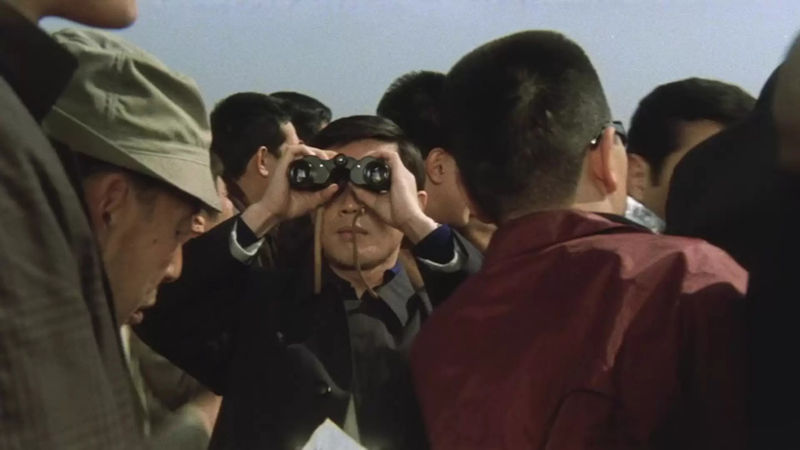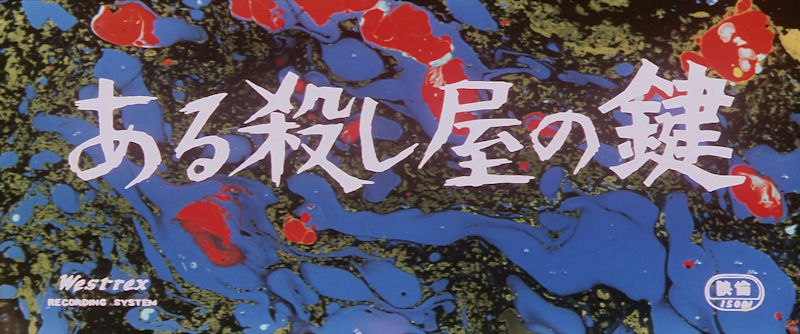
Written by Richard Durrance on 11 Feb 2025
Distributor Arrow • Certificate 12 • Price £18
Any film that is described in any way as being spiritually attached to Branded to Kill will get my attention. I’m easy, I know, but there’s nothing wrong with that. Well, unless of course it turns out to be bad, but that’s not something you hope for if you love cinema.
And such was described by Arrow their release of A Certain Killer (1967) and A Killers Key (1967), by director Kazuo Mori, who is in that select club of having made over 100 films in their career, including some of the original Zatoichi films.
Let’s start with A Certain Killer, shall we?
Calm, methodical, Shiozawa (Raizo Ichikawa) runs a restaurant, except his real work is killing. Maybe running into the gauche, flamboyant Keiko (Yumiko Nogawa) is not best for him, for she’ll cling on tight, regardless of what you want. More so when after successfully fulfilling a contract for the Kimura family, one of their members, Maeda (Mikio Narita) comes to Shiozawa with a proposition.

Some of the references to Branded to Kill are obvious: an assassin, a duplicitous woman, a swinging 60s vibe of sorts, a job gone wrong, a narrative told often in a non-linear fashion. But the reality is this is not the same, but it is also a film made by a studio – Daiei – in transition. The film is co-written by their standout director of the period, Yasuzo Masumura, whose own work was changing to try and bring the studio back to a financial even keel – and that shows in A Certain Killer. There are aspects of Masumura’s work in here, he seems often to explore aspects of duplicity and moral grey areas in depth, but this is a genre film. This is not a criticism in the least but Manji or Red Angel this is not.
The opening reflects the film's strengths, as Shiozawa rents a room in a crumbling building from a deaf landlady, the windows appropriately overlooking a graveyard. Raizo Ichikawa as Shiozawa has a calm persona that suggests thoughtfulness and intention behind what he does.
Cut to:
Keiko taking her top off in a ramen restaurant. She has no money to pay and is either trying to shame the owner into letting her go or sell herself for two bowls of ramen. She’s gauche, in your face, heedless. Shiozawa pays her bill and she follows him out; somehow you think this is not a woman you want on your heels.
I start here because the former is the film’s strength, the latter is where it feels tonally a bit off. A Certain Killer nails the methodical moments, those scenes where yakuza meet with our protagonist to convince the cautious killer to take the initial job. How he then goes about his task, the way in which he learns about his target and exploits it has something of Melville’s Le Samurai (and the remake by Walter Hill, The Driver) in its calm but not violent action. It is the act of a professional with no pleasure involved, it is a cautious act of someone who has mastered the art of a thing: precise, effective, deadly. These moments as I say are where the film shines.
It is less effective in those moments early on with Keiko, mainly because Keiko is a whirlwind, mercurial and emotional; it’s hard to imagine Shiozawa putting up with her working in his restaurant, after she runs out the woman who works there and who has a crush on her boss (and not to mention is an efficient worker unlike Keiko). There’s something of the femme fatale about Keiko but her relationship to Shiozawa never feels quite believable.
More believable is her scheming and with her Maeda, who is perhaps a man in transition: unsure if he wants to be a yakuza or as he professes, Shiozawa’s apprentice (not that Shiozawa would have anything to do with that). To an extent then you always know where the end of the film is going, but that said it ends in the best style possible – and again one that chimes best with the minimalist aspects, and from a character perspective are the most resonant. It’s the classic denouement where there is sameness, difference, expectation fulfilled and just the right amount of half implied surprise. Moreover, each character ends the film true to their nature and that is why it works. Yet aspects towards the middle of the film, the build-up, do sometimes fall a bit flat, mainly due to issues with suspension of disbelief.
You wonder if Masumura was brought in to pull the story together? Who knows? Not me. (Maybe it’s on an extra but I’m terrible at watching extras, always have been.) That said the performances are as the characters require: Yumiko Nogawa’s Keiko is overbearing, self-centred and ultimately true to herself, whereas Raizo Ichikawa as our protagonist has a quiet self-assurance that is hard to do: it’s the classic leading man doing very little, but because you sense the thought processes going on behind the surface, it’s very much all you can hope for.
The end result was a film that I enjoyed a lot in parts, the beginning and end being having some really standout moments, narratively, visually, and tonally, but the middle never quite has the focus you'd hope for. Still, it's a fascinating insight into studio Daiei in transition and is a skillfully made cinematic outing.
Mori was again behind the camera for the second film: A Killer’s Key. Again Raizo Ichikawa stars as our assassin.
 The title sequence goes full psychedelic lava-lamp
The title sequence goes full psychedelic lava-lamp
Now a dance instructor named Nitta, our killer is brought in to murder a loan-shark in hoc to the government and whose evidence could cause a scandal for the yakuza, as well as others with a more honest business. However, the yakuza are not interested in paying up, deciding to kill the killer. In which case they'd better be ready to do it right.
It would be interesting to know when in 1967 A Killers Key was released, as it brought to mind aspects of John Boorman’s film of the same year: Point Blank. There’s something of Lee Marvin’s Walker about Nitta, though revenge is part of what he’s after, it’s really about the money. The rest is all a bit secondary. He’s happy to take a kind of vengeance but most of the time he’s after his payment. Because of Nitta’s inherent cool factor, it really does seem more of an inconvenience when people try to kill him. His character retains the same cool, calm Alain Delon detachment that he has in the first film. Whether Nitta is meant to be exactly the same character as that in A Certain Killer is never clear but it’s certainly played the same, so for all intents and purposes it is.
He has the same attitude to women, though here the role of Hideko (Tomomi Sato), a geisha out – a bit like Nitta - for money is definitely more tonally instep than Keiko in the first film. You suspect Nitta could perhaps fall for her, except that she’s in with just about anyone with means. Coincidences abound as Hideko is being chased by almost everyone who dies, and she’s happy to take the money and run. There’s something refreshingly upfront about her character. She may be after the money but she makes no attempt to hide the fact from the men that wish to buy her, and she feels like her own person. Despite her obvious incentives, she’s no-one's property, to the point where you suspect the film is making a connection between herself and Nitta as a hitman – in part because it’s never critical of either of them.
Narratively it's a more linear film than the first and the plot at times threatens, as many yakuza stories do, to get a little lost in the many levels of yakuza and their plots, but this eventually evens itself out and the film is at its best when focusing on Nitta’s methodical activities. Raizo Ichikawa again really commands in the role, and it seemed to me that he’s almost the perfect love child of Jo Shishido and Tony Leung. He seems to have the best aspects of both actors, especially Leung’s stillness and ability to suggest emotions without seeming to do much at all. That said Tomomi Sato’s Hideko is very engaging, because of her honesty and the sense that her character is slightly unknowable: is there a good girl screaming to get out, or will she show you a good time until more money runs out and it's a fast goodbye? You can make your own mind up about her.
Arguably, A Killer’s Key is the better film, being the more tonally consistent, it also has a surprisingly wry ending. In part it’s a bit of a pat ending but how it’s played is what matters. The remaining cast is a vision of familiar faces, oft cast as yakuza and have their roles down as you would expect. The theme music is borrowed from the first film and this is no bad thing, it’s got a chiming fascination and has hints of the track Roy Budd would write for Get Carter in 1971 and is arguably one of the best things about both films.
A Certain Killer and A Killer’s Key give an insight into Daiei’s transition as a studio and both are solid films. With Raizo Ichikawa in the lead there is a methodical and engaging performance in both instances, but neither outing quite lives up to the very best of the genre. Still packaging them together makes this a tasty proposition - in terms of value, this is a real treat.

Long-time anime dilettante and general lover of cinema. Obsessive re-watcher of 'stuff'. Has issues with dubs. Will go off on tangents about other things that no one else cares about but is sadly passionate about. (Also, parentheses come as standard.) Looks curiously like Jo Shishido, hamster cheeks and all.
posted by Richard Durrance on 08 Jan 2026
posted by Richard Durrance on 17 Dec 2025
posted by Richard Durrance on 12 Dec 2025
posted by Ross Locksley on 09 Dec 2025
posted by Richard Durrance on 28 Nov 2025
posted by Richard Durrance on 25 Nov 2025
posted by Richard Durrance on 18 Nov 2025
posted by Richard Durrance on 14 Nov 2025